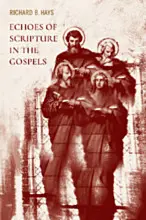

Echoes of Scripture in the Gospels
Pages
524
Publisher
Baylor University Press
Published
6/15/2016
ISBN-13
9781481304917
The claim that the events of Jesus’ life, death, and resurrection took place “according to the Scriptures” stands at the heart of the New Testament’s message. All four canonical Gospels declare that the Torah and the Prophets and the Psalms mysteriously prefigure Jesus. The author of the Fourth Gospel states this claim succinctly: in his narrative, Jesus declares, “If you believed Moses, you would believe me, for he wrote about me” (John 5:46). Yet modern historical criticism characteristically judges that the New Testament’s christological readings of Israel’s Scripture misrepresent the original sense of the texts; this judgment forces fundamental questions to be asked: Why do the Gospel writers read the Scriptures in such surprising ways? Are their readings intelligible as coherent or persuasive interpretations of the Scriptures? Does Christian faith require the illegitimate theft of someone else’s sacred texts?
Echoes of Scripture in the Gospels answers these questions. Richard B. Hays chronicles the dramatically different ways the four Gospel writers interpreted Israel’s Scripture and reveals that their readings were as complementary as they were faithful. In this long-awaited sequel to his Echoes of Scripture in the Letters of Paul, Hays highlights the theological consequences of the Gospel writers’ distinctive hermeneutical approaches and asks what it might mean for contemporary readers to attempt to read Scripture through the eyes of the Evangelists. In particular, Hays carefully describes the Evangelists’ practice of figural reading—an imaginative and retrospective move that creates narrative continuity and wholeness. He shows how each Gospel artfully uses scriptural echoes to re-narrate Israel’s story, to assert that Jesus is the embodiment of Israel’s God, and to prod the church in its vocation to engage the pagan world.
Hays shows how the Evangelists summon readers to a conversion of their imagination. The Evangelists’ use of scriptural echo beckons readers to believe the extraordinary: that Jesus was Israel’s Messiah, that Jesus is Israel’s God, and that contemporary believers are still on mission. The Evangelists, according to Hays, are training our scriptural senses, calling readers to be better scriptural people by being better scriptural poets.
Contents
Preface
Introduction: Figural Interpretation of Israel’s Scripture
The Evangelists as Readers of Israel’s Scripture
Part 1. The Gospel of Mark: Herald of Mystery
Part 2. The Gospel of Matthew: Torah Transfigured
Part 3. The Gospel of Luke: The Liberation of Israel
Part 4. The Gospel of John: The Temple of His Body
Echoes of Scripture in the Gospels answers these questions. Richard B. Hays chronicles the dramatically different ways the four Gospel writers interpreted Israel’s Scripture and reveals that their readings were as complementary as they were faithful. In this long-awaited sequel to his Echoes of Scripture in the Letters of Paul, Hays highlights the theological consequences of the Gospel writers’ distinctive hermeneutical approaches and asks what it might mean for contemporary readers to attempt to read Scripture through the eyes of the Evangelists. In particular, Hays carefully describes the Evangelists’ practice of figural reading—an imaginative and retrospective move that creates narrative continuity and wholeness. He shows how each Gospel artfully uses scriptural echoes to re-narrate Israel’s story, to assert that Jesus is the embodiment of Israel’s God, and to prod the church in its vocation to engage the pagan world.
Hays shows how the Evangelists summon readers to a conversion of their imagination. The Evangelists’ use of scriptural echo beckons readers to believe the extraordinary: that Jesus was Israel’s Messiah, that Jesus is Israel’s God, and that contemporary believers are still on mission. The Evangelists, according to Hays, are training our scriptural senses, calling readers to be better scriptural people by being better scriptural poets.
- 1. “Take heed what you hear”: Mark as Interpreter of Scripture
- 2. Apocalyptic Judgment and Expectancy: Israel’s Story in Mark’s Narrative
- 3. Jesus as the Crucified Messiah
- 4. Watchful Endurance: The Church’s Suffering in Mark’s Narrative
- 5. “Hidden in order to be revealed”: Mark’s Scriptural Hermeneutics
- 6. The Law and the Prophets Fulfilled: Matthew as Interpreter of Scripture
- 7. The End of Exile: Israel’s Story in Matthew’s Narrative
- 8. Jesus as Emmanuel
- 9. Making Disciples of All Nations: The Church’s Mission in Matthew’s Narrative
- 10. The Transfiguration of Torah: Matthew’s Scriptural Hermeneutics
- 11. Continuing the Scriptural Story: Luke as Interpreter of Scripture
- 12. The Promise of Israel’s Liberation: Israel’s Story in Luke’s Narrative
- 13. Jesus as the Redeemer of Israel
- 14. Light to the Nations: The Church’s Witness in Luke’s Narrative
- 15. Opened Eyes and Minds: Luke’s Scriptural Hermeneutics
- 16. “Come and see”: John as Interpreter of Scripture
- 17. “Salvation is from the Jews”: Israel’s Story in John’s Narrative
- 18. Jesus as the Temple
- 19. The Vine and the Branches: The Church’s Oneness in John’s Narrative
- 20. The Figural Web: John’s Scriptural Hermeneutics
- Conclusion: Did Not Our Hearts Burn within Us?
- Notes
- Bibliography
- Index of Scripture and Ancient Sources
- Index of Names